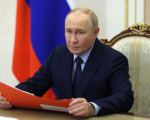The Evolving Role of Defense Stocks in ESG Portfolios Amidst Geopolitical Shifts

The ongoing conflict between Russia and Ukraine has sparked a significant transformation in the way defense stocks are regarded within the realm of environmental, social, and governance (ESG) investing. Traditionally, defense stocks have been excluded from ESG portfolios due to their connection with military activities and warfare, which raised ethical concerns among mission-driven investors. However, in recent months, there has been a growing willingness among ESG fund managers to incorporate defense companies, especially as the geopolitical landscape intensifies and military spending soars.
This shift, though still contentious, represents a profound change in ESG investing dynamics. The CEO of Saab, a Swedish defense and security company, highlighted this evolving trend, noting a remarkable increase in shareholders since the war began. While some institutional investors, such as pension funds, remain hesitant to include defense companies in their portfolios, others are recognizing the importance of national security and the deterrent capabilities provided by such firms. This has led to a reevaluation of whether defense companies, which contribute to societal resilience, should be considered within the scope of ESG.
Saab, which produces advanced military equipment such as missiles and fighter jets, has seen its stock price surge by around 330% since the onset of the war in Ukraine. This performance underscores the growing interest in the defense sector, even among investors traditionally focused on ethical concerns. Yet, skepticism persists, particularly from retail investors and fund managers wary of aligning with companies associated with warfare. For many, the ethical implications of investing in companies that manufacture weapons remain a critical issue.
The debate extends beyond Europe, with ESG investments becoming a politically charged topic in the U.S. In recent years, Republican lawmakers have criticized ESG investing as a form of “woke capitalism,” accusing it of prioritizing social goals over financial returns. On the other hand, Democrats have defended ESG principles, framing them as part of a broader effort to promote responsible business practices. This divide is likely to be further shaped by the outcome of the upcoming U.S. presidential election, which could have significant implications for the future of ESG investing in the defense sector.
Despite the controversies, some industry leaders believe that the role of defense companies in protecting free societies is gaining broader acceptance. Brad Greve, CFO of BAE Systems, remarked that discussions about the positive role of defense firms were almost impossible before the war in Ukraine. The conflict has reshaped public perception, allowing for more open conversations about how defense companies contribute to societal stability and security. BAE Systems, another major defense player, has also seen its stock rise significantly, driven by increased demand for its military products.
As geopolitical tensions remain high and military spending continues to grow, the inclusion of defense stocks in ESG portfolios is likely to be an ongoing topic of debate. Fund managers are divided on whether these companies should be classified as villains or essential components of national security. Ultimately, the future of defense stocks within ESG portfolios will depend on how investors reconcile the need for security with the ethical considerations that have long defined sustainable investing.





















